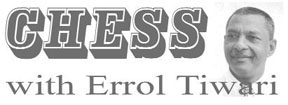We are approaching the final quarter of year 2014, and traditionally, there are three chess tournaments to be completed before the end of December. We have the National Junior Championship, the National Senior Championship and the National Schools Championship. Each of the three championships is significant for the continuation and propagation of the royal game.

He went on to say that chess was basically an obscure game, and to garner attention and sponsorship, an event of considerable proportions should occur in one’s country. In Guyana’s case, being a country that is practically non-existent on the international chess map, that event may well have been our participation at the 2014 Tromso Olympiad which made a few noticeable headlines following a 34-year-old hiatus. We know for certain that we have one thing in common with other prominent chess nations. We have our youngsters playing chess. And this circumstance represents our hope for the future. The team which represented Guyana at Tromso was comprised principally of our young grandmaster aspirants. It is therefore likely that for this year’s national junior championship tournament, the number of entrants will increase in the face of Tromso. All would be trying to place their stamp of authority on the championship. And all would likely appreciate the notion that chess is indeed being linked in a promising way to young people, as was set out in last week’s chess column. The points system method may well be in order to awaken the competitive spirit. There is a precedent for that method; it was implemented by FIDE, the world chess organization, after careful consideration. It’s called the FIDE Grand Prix, a biennial chess tournament which forms part of the qualification cycle for the Men and Women world championship matches. The Grand Prix is in essence a four tournament series to help select a challenger for the world championship. The series is measured by the number of points which a player accumulates.
A victory in a Grand Prix tournament ensures 170 points; second place, 120 points; third place, 90 points; fourth place, 70 point , and so on. Therefore, if such a method is introduced for our national junior and senior chess championships within a two-year period, we may be able to determine our finest players based on their individual performances and their selective scores, to compete in an invitational tournament for selection to the next chess Olympiad. Undoubtedly, we can make our mark at the next, and future Olympiads.
The system eradicates, most assuredly, errors related to the difficult process of Olympic selection.
The accumulation of hard-earned points for the national junior and senior chess championships and the ensuing fights to acquire them, would bring out a kind of suppressed confidence in our players. And all other things being equal, confidence wins games. Allied to the will to win, it sparks the mental ignition, brings forth ideas, dispels doubts and promotes clear thinking.
In December, the National Schools Chess Championship is scheduled to take place. The tournament is being sponsored by the Ministry of Culture, Youth and Sport and is the brain-child of Minister Frank Anthony. The championship has previously brought together schools from Bartica, Berbice, Linden, Essequibo, the East and West coasts and Georgetown.
It is the only one of its kind in Guyana. The importance of this schools’ tournament obviously cannot be underestimated and is hinged on the number of chess players who emerge in the junior category of the sport. Simply put, if we have an interest in popularizing chess, which as we all know is steeped in ancient tradition, we should embrace the meeting of our schools if only it is once per year.





